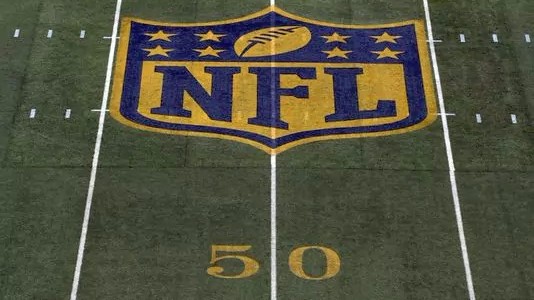HOUSTON – A 30-second commercial that was scheduled to air during the first quarter of the Super Bowl has been rejected by the NFL amid questions from USA TODAY Sports about how the advertisement squares with the league’s policy regarding banned substances.
The ad is for the nutrition and dietary supplement retailer GNC, which has more than 6,500 locations in the USA. The company announced the commercial Dec. 20, celebrating that “for the first time in the company's history, it will advertise in the Super Bowl.”
The content of the ad isn’t controversial. What made it problematic is GNC is listed under “prohibited companies” on a memo from the NFL and the players union – a warning for NFL players not to endorse or have a business relationship with it because it has been “associated with the production, manufacture or distribution of NFL banned substances.”
USA TODAY Sports contacted the players union about the ad on Thursday. In response, George Atallah, the union’s assistant executive director, said the union wrote the NFL a letter voicing its concerns about the ad and the conflict it posed.
In effect, the GNC ad created an awkward situation in which the NFL’s premier event would include advertising from a company the league has banned its players from promoting.
On Monday, NFL spokesman Brian McCarthy told USA TODAY Sports, “We have told FOX it may not air in Super Bowl or any NFL programming.”
Fox, which is broadcasting the Super Bowl, declined comment, saying it does not discuss what advertising is in the game. A 30-second commercial during the Super Bowl this year costs about $5 million.
GNC told USA TODAY Sports it was blindsided by the rejection Monday after negotiating a deal with Fox last month.
“We sent the spot to Fox on Thursday one last time, and they cleared it,” said Jeff Hennion, GNC’s executive vice president, chief marketing & e-commerce officer. “Then Friday evening they called and said the NFL had an issue with the logo. We spent the weekend working through alternatives.
“And then at 1 o’clock (Monday) we were notified by Fox that the NFL had rejected us, our commercial and rejected us as an advertiser in the Super Bowl. And that was the first we had heard there was any concern with GNC’s participation.”
Hennion said that products sold at GNC only contain two substances banned by the NFL: DHEA, an anabolic agent, and the stimulant synephrine. That’s out of more than 100 banned substances listed by the NFL.
The NFL works with the network broadcasting the game and has advertising guidelines on what products and businesses are allowed to advertise during their broadcasts. For example, the league forbids ads for gambling, tobacco products and establishments featuring nude performers.
The company’s ad planned for the Super Bowl did not reference specific products and instead had a motivational theme about having the courage to change. “Don’t ever let anyone tell you you can’t change,” says a preliminary cut of the ad.
The problem for GNC is that it is listed on the NFL and NFL Players Association’s prohibited list for a reason.
“The fact that we sell those apparently have us still on a list where the NFL is uncomfortable with us advertising in games,” Hennion said.
GNC has faced legal trouble recently. In December, the federal government announced it had reached a settlement in which GNC would pay the government $2.25 million after an investigation revealed that “GNC’s practices related to ensuring the legality of products on its shelves were lacking.”
According to the government, GNC engaged in acts and omissions that allowed a misbranded supplement to be sold at GNC locations nationwide in 2013, a product that was manufactured at Dallas-based USP Labs.
The company said it had relied on USP Labs’ representations about the products and removed the product from its shelves years ago.
In 2015, the Oregon attorney general also filed a lawsuit against GNC, accusing the company of selling supplements containing the illegal ingredients picamilon and BMPEA. The company said the claims were without merit and that it had removed from sale all products containing those ingredients.
In recent years, some NFL players have been suspended by the league after testing positive for banned substances they say came from products purchased at GNC. The substances are generally considered performance-enhancing. In 2013, the agent for Minnesota Vikings tackle DeMarcus Love told USA TODAY Sports that his client inadvertently took a banned substance that was in a product purchased there. The same year, Washington Redskins defensive lineman Jarvis Jenkins was suspended four game and gave the same reason.
The Super Bowl ad was part of a marketing effort by the company to reboot its brand.
"The decision to make the substantial investment in Super Bowl advertising and promotions reflects our commitment to raise awareness of the One New GNC and invite consumers back into our stores,” said Bob Moran, GNC's interim CEO, in a December statement announcing the Super Bowl ad.
Pieter Cohen, a supplements expert and assistant professor at Harvard Medical School, noted the league allows beer commercials and said “GNC has every right to try to get a Super Bowl pitch and try to rebrand.” However, he told USA TODAY Sports this case would have raised questions for the NFL.
“What message are they sending?” Cohen said. “If they’re telling their athletes to avoid certain shops but are using their platform to get those same shops into the mind of the young consumer, that’s a great question for the NFL.”
Contributing: Erik Brady


